Stuart Aken's Blog, page 298
July 17, 2011
Stuart's Daily Word Spot: Abdicate
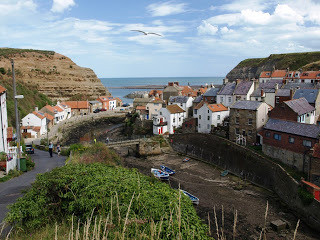 Abdicate: verb - castoff, discard; relinquish sovereign power formally; renounce a throne, highoffice, or function.
Abdicate: verb - castoff, discard; relinquish sovereign power formally; renounce a throne, highoffice, or function.'When Edward VII decided to abdicate, in order to marryWallis Simpson, he caused a constitutional crisis in Britain and was neverfully forgiven by the rest of the royal family.'
Picture: the picturesque village of Staithes, on the North Yorkshire coast.
Published on July 17, 2011 07:00
July 16, 2011
Stuart's Daily Word Spot: Elemental or elementary?
Elemental or elementary?
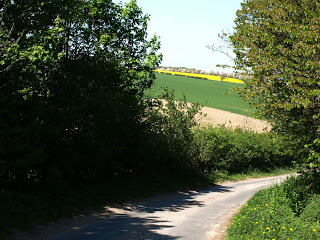 Elemental: adjective- being an element; specifically - existing in the form of an uncombinedchemical element; the basic or essential constituent of something; fundamental,simple, uncomplicated; dealing with the rudiments of something; of, relatingto, or resembling a great force of nature.Elementary: adjective- dealing with the simplest elements or principles of something; relating to anelementary school.So, something elemental is essential or integral to nature,whereas something elementary is fundamental.
Elemental: adjective- being an element; specifically - existing in the form of an uncombinedchemical element; the basic or essential constituent of something; fundamental,simple, uncomplicated; dealing with the rudiments of something; of, relatingto, or resembling a great force of nature.Elementary: adjective- dealing with the simplest elements or principles of something; relating to anelementary school.So, something elemental is essential or integral to nature,whereas something elementary is fundamental.'The raging tempest that cast great waves on the shore,tearing up the coastal trees and upending the fishing boats, was elemental.'
'I don't see how you can pretend to be a writer, my friend,when you fail to understand the most elementary rules of grammar.'
Published on July 16, 2011 07:00
July 15, 2011
Stuart's Daily Word Spot: Magic realism
 Magic realism: blending fantastic or mythical elements in a matter-of-factway into seemingly realistic fiction. The term magic realism isrelatively recent, being first applied by Cuban novelist Alejo Carpentier, inthe 1940s, when he recognized this style in much Latin-American literature. Amongthe Latin-American magic realists are Gabriel García Márquez, Jorge Amado, JorgeLuis Borges and Isabel Allende.Magic realism is also described as an aesthetic style offiction, which mixes magical elements with the real world. The narrativeexplains such magical elements as real occurrences, presenting them in astraightforward manner that places reality and the fantastical in the samestream of thought. Salman Rushdie famously uses the technique in The SatanicVerses to great effect.
Magic realism: blending fantastic or mythical elements in a matter-of-factway into seemingly realistic fiction. The term magic realism isrelatively recent, being first applied by Cuban novelist Alejo Carpentier, inthe 1940s, when he recognized this style in much Latin-American literature. Amongthe Latin-American magic realists are Gabriel García Márquez, Jorge Amado, JorgeLuis Borges and Isabel Allende.Magic realism is also described as an aesthetic style offiction, which mixes magical elements with the real world. The narrativeexplains such magical elements as real occurrences, presenting them in astraightforward manner that places reality and the fantastical in the samestream of thought. Salman Rushdie famously uses the technique in The SatanicVerses to great effect.
Published on July 15, 2011 07:59
July 14, 2011
90 Author Interviews Revisited
Listed below are the names of the authors I have interviewedon this blog during the past year. If you click on the author's name, you willarrive at the interview on the blog. They're listed in order of appearance andone or two may be listed twice, because they've come back for more. There's no significance to the colours; just an attempt to separate the names out a bit.
AvrilField-Taylor Penny Grubb J.FJenkins Linda Acaster KarenWolfe Madeleine McDonald KathleenMcKenna Gwen Morrison RichardJay Parker Sasha Petrova StevenJensen Stacey Danson CatherineChisnall John Pearson SharonDwyer Jake Webber SibelHodge NickQuantrill SarahBarnard Lila Munro JRussell Rose BethAnn Buehler NeilWhite Valmore DanielsKristalMcKerrington Linda Swift ClaudeBouchard Danielle Thorn P.J.Dean Toni V. Sweeney, aka Icy Snow Blackstone MargaretBlake J.B. Hendricks MoniqueMartin Karen Cantwell DavidPerlmutter Rodolfo Pena AndyFrankham-Allen Tracey Alley PhillipChen Edward Wright LorraineSears L.M. Pruitt L.Anne Carrington Patricia Rockwell M.J.Webb Derek J. Canyon GeoffreyThorne SueAnn Jackson J.E.Taylor K.J. Rigby VictoriaRoder Jesse S. Greever CatherineCondie Paul Rudd LakishaSpletzer Lyn Fuchs LauraB. Gshwandtner Terry Irvin RuthWheeler Joanne Kerzmann AlanNayes Charlene Wilson AlanNaylor Poppet ChristaPolkinhorn P.I. Barrington TommyTaylor Wayne Gerard Trotman SylviaL. Ramsey Wayne Zurl ShielaStewart Jean Fullerton ElenaDorothy Bowman Dewey W. Dempsey RonnieDauber Zoe Winters R.S.Charles Lesley Cookman PatriciaMitchell Lapidus Kristie Leigh MaguireElizabethC. Mock Gary Hoover HelmyParlente Kasuma Valerie Douglas ChrisHambleton Boyd Lemon IanAlexander Lucinda Brant LindaAcaster Anonymous Indian DeniseVarrico
Last week, 7 July, I interviewed myself here (an oddconcept, but the reasons will be clear if you visit it) – the link isn'tavailable as I write this, because I've scheduled this before the interview isdue to appear. But it can be found in the archive now, if you're interested.Next week, the interview will be with Susan Moody; I thinkyou'll find it worthwhile returning for that one.
If you've discovered something of interest here, please share it with your friends by using the 'share' buttons below to connect with Twitter, Facebook and the other sites listed. Thank you.
Published on July 14, 2011 08:30
Stuart's Daily Word Spot: Zeal
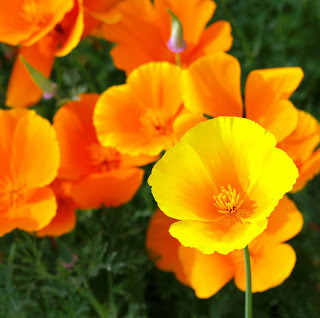 Zeal: noun – eagerness, ardent interest in pursuit ofsomething; fervour, passion.
Zeal: noun – eagerness, ardent interest in pursuit ofsomething; fervour, passion.'In my epic fantasy, Aglydron is a character who shows greatzeal in his ardent application of the rules rather than the spirit of hisreligion, and causes much suffering as a result.'
Watch out for an author Interview with Susan moody next week.
Picture: just a bunch of Californian Poppies, growing in my back garden.
Published on July 14, 2011 07:00
July 13, 2011
Stuart's Daily Word Spot: Economic or economical
Economic or economical:
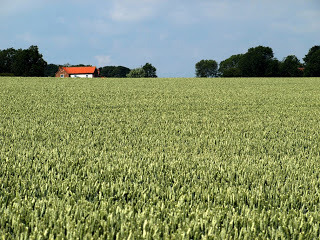 Economic: adjective- of or relating to economics; relating to, or based on consumption, productionand distribution of goods and services; of or relating to an economy; possessingpractical or industrial significance or uses; affecting material resources; thescience of economics. Economical adjective- marked by careful, efficient, and prudent use of resources; operatingwith little waste or at a saving; sparing.
Economic: adjective- of or relating to economics; relating to, or based on consumption, productionand distribution of goods and services; of or relating to an economy; possessingpractical or industrial significance or uses; affecting material resources; thescience of economics. Economical adjective- marked by careful, efficient, and prudent use of resources; operatingwith little waste or at a saving; sparing.So, a person is not generally economic, but it may be thatthe same person uses economic theory and practice to determine the mosteconomical use of resources. Anything that is economical is generally characterisedby saving money or resources.
'The economic indicators all showed that the country's financeswere in serious debt following the disastrous collapse of the banking system atthe hands of greedy and imprudent bankers.'
'Caroline was so economical with the truth that it wasdifficult to give credence to anything she said.'
Picture: a farm nestling in the ripening wheat fields a short walk from my home.
Published on July 13, 2011 07:00
July 12, 2011
Stuart's Daily Word Spot: Irony
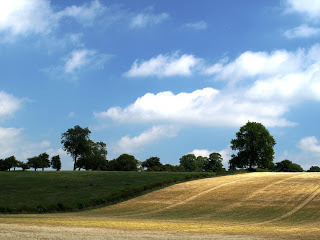 Irony: noun - a pretenceof ignorance used to entice others into saying things that can then bechallenged; the use of language, normally expressing the opposite, to make somepoint; humorous use of praise to suggest condemnation or contempt. In literature, irony is a device, in which the actualmeaning is hidden or contradicted by the literal meaning of what is said orwritten. In dramatic irony, there is incongruity between what's expected andwhat actually happens. Irony often comes from a resigned awareness of the contrastbetween what is and what should be and is expressed through controlled pathos lackingsentimentality. It's a type of indirection that avoids overt praise or censure,as in the casual irony of statements like, 'Brilliant!' meaning, 'Stupid', or 'Thecomprehensive philanthropy of conservative politics.' meaning 'The absoluteself-serving meanness of conservative politics.'.When used in a none literary fashion, irony is usually called'sarcasm'.There is a pervasive theory amongst Brits that Americanshave no understanding of irony, which probably stems from the British characteristicof self-deprecation contrasted with what the islanders see as the brashself-confidence of the newer country.
Irony: noun - a pretenceof ignorance used to entice others into saying things that can then bechallenged; the use of language, normally expressing the opposite, to make somepoint; humorous use of praise to suggest condemnation or contempt. In literature, irony is a device, in which the actualmeaning is hidden or contradicted by the literal meaning of what is said orwritten. In dramatic irony, there is incongruity between what's expected andwhat actually happens. Irony often comes from a resigned awareness of the contrastbetween what is and what should be and is expressed through controlled pathos lackingsentimentality. It's a type of indirection that avoids overt praise or censure,as in the casual irony of statements like, 'Brilliant!' meaning, 'Stupid', or 'Thecomprehensive philanthropy of conservative politics.' meaning 'The absoluteself-serving meanness of conservative politics.'.When used in a none literary fashion, irony is usually called'sarcasm'.There is a pervasive theory amongst Brits that Americanshave no understanding of irony, which probably stems from the British characteristicof self-deprecation contrasted with what the islanders see as the brashself-confidence of the newer country.'When Brenda referred to the level of intellectual tensionconveyed by the two naked female mud-wrestlers, Bryan was oblivious of her ironyand actually took his eyes off the action in order to agree with her.'
Picture: In the days before Google took over Blogger, I was able to associate posts with free images through a little widget called Zemanta. I might've delighted some of you, disgusted others, with a picture of nude women mud-wrestlers, but you'll have to make do with this picture of a local landscape, taken on a walk just a short distance from my home. I don't think there's any irony here; unless you think otherwise, of course.
Published on July 12, 2011 07:00
July 11, 2011
Stuart's Daily Word Spot: Yam
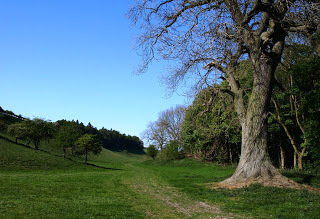 Yam: noun - ediblestarchy tuberous root of plants of the genus Dioscorea, of the familyDioscoreaceae, used as a staple in tropical areas; plant that produces yams;moist and orange-fleshed sweet potato.
Yam: noun - ediblestarchy tuberous root of plants of the genus Dioscorea, of the familyDioscoreaceae, used as a staple in tropical areas; plant that produces yams;moist and orange-fleshed sweet potato.'In parts of New Guinea, the yam is used not only as a foodbut also as a measure of wealth and status: the more yams a man has, the greaterhis position in society.'
Picture: Looking north along Cow Dale, near Huggate, East Yorkshire.
Published on July 11, 2011 07:00
July 10, 2011
Stuart's Daily Word Spot: Different from or different than
 Different from or different than: In British English, andits cousins, you can't follow 'different' with 'than'. Although people use both'to' and 'from', the preferred use is 'from'. Fowler, 'English Usage' doesn't evenmention 'different than', probably because he wasn't aware of it at the time:it is definitely US usage. And, here in Britain, it's generally consideredunacceptable. Things are logically different from one another, and using 'than'after 'different' is regarded as a grammatical blunder.
Different from or different than: In British English, andits cousins, you can't follow 'different' with 'than'. Although people use both'to' and 'from', the preferred use is 'from'. Fowler, 'English Usage' doesn't evenmention 'different than', probably because he wasn't aware of it at the time:it is definitely US usage. And, here in Britain, it's generally consideredunacceptable. Things are logically different from one another, and using 'than'after 'different' is regarded as a grammatical blunder.'The bikini Elle's wearing is different from the one wornby Corinne, but I think that Elle's is better than hers.'
Picture: the North Sea at Bridlington, East Yorkshire.
Published on July 10, 2011 07:00
July 9, 2011
Stuart's Daily Word Spot: In medias res
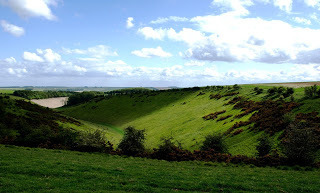 In medias res: Meaning 'into the middle of things', this Latinphrase denotes the literary narrative technique where the story begins at themid-point or even the end, instead of the beginning. Setting, character, andconflict are generally established using flashback and, sometimes, expository dialogueto explain and describe what has happened prior to the opening events. Its mainadvantage is that the story opens with dramatic action instead of beginningwith an explanation and description of the characters and situation. An example is Homer's Odyssey, where we first hear about Odysseus'journey as he's kept captive on Calypso's island. Later, we discover that mostof Odysseus' journey takes place before that point in the narrative. The technique is used fairly widely in modern literature as a device tohook the attention of readers who might otherwise be impatient enough todiscard a good story before it has really begun.
In medias res: Meaning 'into the middle of things', this Latinphrase denotes the literary narrative technique where the story begins at themid-point or even the end, instead of the beginning. Setting, character, andconflict are generally established using flashback and, sometimes, expository dialogueto explain and describe what has happened prior to the opening events. Its mainadvantage is that the story opens with dramatic action instead of beginningwith an explanation and description of the characters and situation. An example is Homer's Odyssey, where we first hear about Odysseus'journey as he's kept captive on Calypso's island. Later, we discover that mostof Odysseus' journey takes place before that point in the narrative. The technique is used fairly widely in modern literature as a device tohook the attention of readers who might otherwise be impatient enough todiscard a good story before it has really begun.9 July 1911: Mervyn Peake, author of Gormenghast, born.
Picture: Nettle Dale, near Huggate, East Yorkshire.
Published on July 09, 2011 07:00



